- Home
- Ian Buruma
Their Promised Land Page 3
Their Promised Land Read online
Page 3
One story that stands out for me, as an example, is beyond the scope of this book, which ends in 1945, but is still intimately linked to their narrative as I have chosen to present it. After all their talk in wartime letters of the hateful Germans, whose targets of mass killing would, if they had been able to reach them, have included Bernard and Win and all their children, after all the news of murdered relatives, of the mounds of corpses at Bergen-Belsen, and the gas chambers of Auschwitz, after all that, they contacted a German POW camp near Newbury in 1946 to invite two of Hitler’s former soldiers to spend Christmas at their family home in Kintbury.
It was, in my aunt Hilary’s recollection, a somewhat stilted occasion. How could it have been otherwise? Too much had to be left unspoken. The immediate past was still mined with explosives, however innocent these particular Germans might have been of one of history’s darkest crimes. It was too soon for a Jewish family to celebrate Christmas with German soldiers.
But the Germans never forgot this gesture of kindness. For them it restored a sense of humanity that had been all but destroyed in the last decade. I like to think that Bernard and Win reached out to these men in the same spirit with which they rescued the twelve Jewish children. They did it out of common decency. I say common, but in fact, of course, it was highly uncommon.
There is much of this spirit in the letters. But decency is not the same thing as love, which is the main subject of the correspondence. Expressions of love, except in good poetry, when they are transformed into art, can be cloying. In fact, the love between Bernard and Win is not the main subject of this book either. Instead, I have selected passages that express how they saw themselves in relation to the world they lived in. What interested me were the stories they told each other and themselves about who they were.
Questions of class, culture, and nationality can be addressed in a scholarly way, with statistics and sociological theory. But this was of no interest to me. I wanted to find out how two people very close to me dealt with these questions themselves. They are questions I have asked myself in pretty much every book I have written. The reason is autobiographical. Growing up with more than one culture, with parents of different nationalities and religious backgrounds (I leave race and ethnicity aside), forces one to think about one’s place in the world. It is the fate of all people who feel for one reason or another that they are in a minority. If you are in the majority, you can afford to swim along with the mainstream without giving it too much thought. But a Jew in a society of mostly Gentiles, a Muslim in Europe, a black in a predominantly white country, or a homosexual, especially in places where love of your own sex is unaccepted, is forced to consider his or her place more deeply, to make up his or her own story.
This implies choice. Some of us have more freedom to choose our own identities than others, depending on time, place, and social position. I had more freedom than my grandparents. They had more freedom than people from a less privileged background, or Jews faced with more anti-Semitism.
Bernard and Win wrote to one another about their place in the world as insiders who were outsiders too, a perspective that also marks the films of their son John: Billy Liar, Midnight Cowboy, Sunday Bloody Sunday, An Englishman Abroad. By using their own words, I have contrived to produce a kind of novel in letters, with myself as a kind of Greek chorus. What emerged might not be how they would have liked to see themselves. Their portraits inevitably reflect my own preoccupations, so it should be read as a type of memoir as well. And always, in the background, like a classical score, there is the music that accompanied the lives of two very British Jews, whose favorite piece was composed by Richard Wagner as a private tribute to his wife and children: the Siegfried Idyll. It was first performed in 1870, on Christmas Day.
One
FIRST LOVE
April 25, 1915:
Dear Winnie,
I hope you won’t get bored with this effusion of correspondence. But, no,—I don’t see why I should apologize as you are one up on me & this in the shape of a letter. Moreover it is only polite to answer a letter from a lady. So “as you were” & cross all this first lot out. This brings me back to the beginning, doesn’t it & nothing said but a whole page used? That is “comme il est fait” as they say in Germany.
So begins the first letter in my possession sent by Bernard to Winnie, as he still called her then. It can’t have been the first one he ever wrote. In a letter written in 1919, he reminds her of her first letters to him, signed “Winifred Regensburg.” Winifred was a name she loathed with a passion, hence the change to Winnie, or later to Win, or sometimes Wincie, anything but Winifred.
Win in Hampstead
The facetious tone is that of the jokey schoolboy that Bernard would adopt on occasion for the rest of his life. “Ooooh, Doctor!” the cleaning ladies would squeal as he rolled the empty beer bottles along the corridor to the kitchen at St. Mary Woodlands when he was well into his seventies. He was nineteen years old when he wrote this letter. Win was a year younger.
The address embossed on the letterhead is 15 Fitzjohn’s Avenue, N.W. 3. Bernard lived there as an only child with his parents in one of those large Victorian redbrick houses that are now divided into flats and studios. Win lived nearby on Parsifal Road, in a similar house, only smaller. Both of their fathers were stockbrokers in the City of London. Richard Schlesinger was the more successful; known among his colleagues as Richard the Thirteenth, he was reputedly able to squeeze thirteen pence out of a shilling, which, as some people might recall, was worth only twelve. Win’s father, Herman Regensburg, was said to have been more interested in music than in stocks.
Music was the center of family life among many Hampstead Jews. Music was a sign of education, high culture an emblem of class. This was the way it had been in Germany, where a classical education was the indispensable mark of the high bourgeoisie, the Bildungsbürger. Hampstead is where the Jewish Bildungsbürger lived. Fitzjohn’s Avenue was also known, perhaps not always kindly, as “Fitzjews Avenue.”
Music is the common subject of the first letters. It is also how my grandparents met. Win was giving a violin recital on a Sunday afternoon at the home of Leo Fernberg, Bernard’s cousin, who was also in love with her, an unhappy situation that would cause some tension between the two men. Various uncles and aunts and cousins—the Sterns, the Ellingers, the Seligmans, the Schwabs—would have been there, having tea and cakes. English was no doubt the common language, even though a smattering of German—never, never Yiddish—might have been spoken too. I once met one of the Ellinger aunts at a very advanced age; she remembered Richard Schlesinger as being “very British” and wearing a green suit.
His letter continues:
The finest concert of the week was yesterday’s, Saturday’s, and by far the most beautiful work I have heard for a long time & one of the most beautiful I have ever heard was Brahms’s Requiem. The [Beethoven’s] IXth . . . was grand & thrilling all the way through. The last movement sweeps all before it and carries you right through God Save the King, out of Queen’s Hall onto No. 13 bus where you are only awakened to your senses by being barged into by a Tommie on your left & squashing a lady on your right & you realize at last that the world is not all “Freude schöner Götterfunken.”
Indeed, the world was not all “Joy, lovely divine light.” The war had been going on for almost a year already. The poster of Lord Kitchener pointing his finger, with the words “Your country needs you” in blood-red letters, was everywhere. Many thousands of young men all over Europe were joining up for the grandest war of all time in a spirit of great patriotic excitement. But for an Anglo-German family things must have been a little complicated. Even though some letters from relatives in Germany still miraculously got through, Bernard’s father in particular was depressed about the war between his adopted and native countries.
Win too was often melancholy. Her bouts of gloominess, shared by her father and some of her future offsprin
g, were known in the family, with a typical reference to Wagner’s Ring, as “the curse of the Regensburgs.” The tone of her letters is still rather formal at this stage:
May 14:
Dear Bernard,
I must just write a few words to thank you for your post-card; it was awfully jolly of you to think of me . . . everything is so frantically depressing at home, that it is almost impossible to breathe. I have actually not got the heart to practice. I have scarcely looked at my fiddle, except when I have to play at college. Now I really must shut myself up, or I shall be depressing you as well. I promised to write about concerts, & I have written nothing but complaints.
It was Bernard’s customary role to cheer her up. She would always recall that she fell in love with him on first sight, because of the broad grin on his face when he entered the drawing room carrying a cello on that Sunday afternoon at the Fernbergs’. If she was prone to dwell on the shadows of life, he could be relied upon to see the sunny side, even at times when there was little brightness to be seen.
Bernard’s letter of May 26 is sent from his school, Uppingham, not one of the poshest public schools, but a respectable establishment with a solid reputation. Bernard, gregarious and keen on games, adored his school days. He played rugby for the first XV, a sure sign of schoolboy success, and was head of his house, something that both (especially Win) would recall with pride. Boris Karloff, the Hollywood monster, and Ronald Firbank, master of the camp novel (Prancing Nigger et al.), had been at Uppingham a few years before Bernard, but I rather doubt that they took their status as Old Uppinghamians as seriously as he did.
Bernard at Uppingham
Bernard tries to make Win laugh with a story of being reprimanded for grinning in chapel, but then tells her something that she would find quite unsettling:
I am awfully bucked in a way. It is now definitely settled that I am leaving at the end of this term.
He adds, “In orchestra we are doing all English music. It’s quite pretty, some of it. [The music master] calls it ‘healthy.’ Why this epithet I can’t imagine. I wonder if he considers Beethoven—night-marey & Brahms—indigestible?”
The music master may have been a little extreme. But the mood in Britain was more hysterically anti-German in 1915 than in 1940. Germans—the Bosch,* the Huns—were the enemies in the Great War. Nazis were the focus of hatred in the later war, and the music master’s attitude would probably have struck more people as excessive.
Win’s reply, of May 28, from 17 Parsifal Road:
Dear Bernard,
Thank you very much for your ripping letter; it had the desired effect, & cheered me up considerably. There is only one thing about which I cannot agree with you; I fail to be bucked that you are leaving school this term. Does that mean that you are going to join the RAMC [Royal Army Medical Corps] at once, or will you stop at home for a bit? In any case, I hope you will need plenty of training before you will go to the front.
I don’t know when Bernard had decided to become a doctor, but he certainly never showed any interest in stockbroking. Joining the RAMC must have been his own idea. Perhaps he was especially keen to demonstrate his patriotism, in light of his family background. In any case, he signed up before the end of term. In June, while still at school, he was taking first aid lessons with masters’ wives and other local women. But even though his loyalty to England was never in doubt, even at his very young age he was irritated by the extreme hostility toward everything German, far more irritated, not surprisingly, than he would be by anti-German sentiments in World War II:
My ’Cello master, an awful sport, who has been at Uppingham 17 years & far longer than the beastly old Headmaster is going to be given the sack because he is a naturalized German. Typical of the narrow Head-man!
Aside from his first aid classes, Bernard was preparing for his entrance exams to Cambridge. But he worries that he will never get there because of the war: “Don’t you think it’s a dirty trick?”
She replies, in her neat young girlish handwriting, that she is “very, very sorry to see from your letter, that you are troubled by the thought that you might never get to Cambridge at all. You mustn’t get down in the dumps, or even let such thoughts enter your head. Personally, I am hoping for all I am worth, that some miracle will intervene to stop this beastly war, before any of you boys have to go.”
On July 15, Bernard thinks he is finally off to the battlefront, a piece of news that he conveys in his usual facetious schoolboy style. The letter is sent from Uppingham:
Mille remerciments pour votre lettre dernière. This is what will have to be in a few weeks. Goodbye to old English & start life afresh with broken—perhaps beyond repair—French. I ought to be out there in three weeks or so as an orderly under a doctor who has gone out from here to be head surgeon at a hospital in Havre. Under us—a friend is probably going out with me—are to be six unruly French orderlies described as the “limit” & all around us to all accounts are to be rats and smells. Thrilling, n’est ce pas?
Bernard (SECOND FROM LEFT) on a visit to Uppingham before being sent to France
One month later, Private Schlesinger, RAMC, is still in England, billeted with a police constable and his wife in Great Missenden, Buckinghamshire, “sitting, never before so careless and irresponsible, smoking my wee pipe, whilst imagining all the smells and the rats that might have been.”
The training, he assures her, “promises to be very interesting & not too strenuous.” On one of the “stretcher-drills,” he has to pretend to be a wounded soldier lying in a wood: “I was jolly glad I wasn’t really wounded, otherwise I am sure that by the time they had decided what to do with me, they would no longer have needed a stretcher but rather a couple of spades to dig my grave. And so my life continues until further notice, and a jolly one it will be I’m sure.”
The jocular tone, though characteristic, might have disguised a degree of nervous apprehension. But Bernard didn’t yet have a clear idea of what the actual battlefront was like. In fact, he was impatient to be sent to France as soon as possible. The drills reminded him of military training he had done for years at school. On August 24, a letter is sent from the RAMC headquarters at Great Missenden. He complains that his cap doesn’t fit his large head, even though recruiting posters everywhere bear the message “If the cap fits, join to-day.”
It was one of these posters that attracted him to his later regiment, the Queen’s Westminster Rifles. A strapping young soldier in khaki puttees smiles from the picture as if inviting one and all to a grand party. Bernard liked the look of him. He actually met the man in the picture by pure chance during the war and they became lifelong friends. His name was Harry, a silversmith in civilian life. In the letter of August 24, there is a mention of another friend, from school, named Sharp, whom Bernard is trying to get to share his billet. The effort elicits a peculiar remark:
Still so far I am unable to get my friend down & stand in danger of having a fellow named Cohen—who is very Coheny—as my co-billeter.
To interpret this as anti-Semitism (or self-hatred, if you prefer) would be misleading. In fact, it is more likely a matter of class. Bernard was not a snob. He refused to become an officer, preferring a place in the ranks. But Cohen was most likely not from Fitzjohn’s Avenue, or Parsifal Road, but from Whitechapel perhaps, or the Leylands in Leeds, areas where poorer, more religious Jews lived. In any case, Cohen was too obviously Jewish for Bernard’s taste. Perhaps he even had a foreign-sounding accent.
Bernard’s own foreign name caused enough difficulties, but he makes light of this:
I’ve never in my life had such a variety of names as here—not even at Uppingham. The Sgt. Major knocks off at 6:30 during Physical Drill with the tennis ball maker’s name [Slazenger]. I come home to breakfast and get “Good morning, Mr.” . . . . . . & that’s as far as Mr. and Mrs. P[olice] C[onstable] get with it. During the course of the next parade I am called the following v
arying concoctions & contusions by the men—Bernard (with the emphasis on the second syllable), Schles, Slesi, Schlosh, Schlosly & many others.
Nothing much happens in the summer of 1915. He is bored in Great Missenden. She goes off for a family holiday to a rented house in the country. And always the exchanges return to music: “Cook has gone up to London,” Win relates, so she and her elder brother, my great-uncle Walter, and her sister, Meg, have to fend for themselves, having drinks “to the accompaniment of a Haydn trio. We made the beds to a Brahms quintet, & cooked dinner with doses of Schubert & Beethoven trios. I am sure no cook-house-parlour maids ever worked to such classical stuff before.”
There are photographs of this trip, not much bigger than postage stamps, showing Win, petite in the midst of her siblings and aunts, a walking stick in her right hand, dressed in a tweed skirt and sporting a beret at a jaunty angle. They all seem in fine spirits, laughing at the camera. There is not a hint of war. The jollity on the surface is what makes these pictures, and much else about the first years of the war, so chilling.
On September 6, Bernard writes a letter from Oxford, where he has his first glimpse of the real consequences of the war. He attended an organ recital in Christ Church Cathedral, “the first programme of decent music I’ve heard since I played for the last time in the Uppingham Gym. at the end of my last term, years ago it seems to me now. It was a treat & such a change from comic songs and marching twaddle.”
But then:
We were up till twelve the night before watching a convoy of wounded arrive & bearing them from their bunks in the train on stretchers to the ambulance motors. It is quite a thrilling sight to see and help a convoy arrive. The platform is cleared of everybody but RAMC & St. John’s ambulance men. On the platform are piled up stretchers, pillows, blankets & trolleys. Doctors are in preparation & groups of RAMC men are talking impatiently in groups & are preparing the stretchers. Outside the station are lined up ambulances, and kind ladies with milk & very watery lemonade (I tasted it).

 A Japanese Mirror
A Japanese Mirror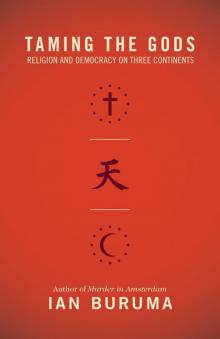 Taming the Gods
Taming the Gods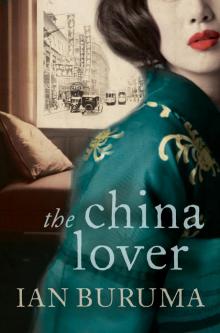 The China Lover
The China Lover A Tokyo Romance
A Tokyo Romance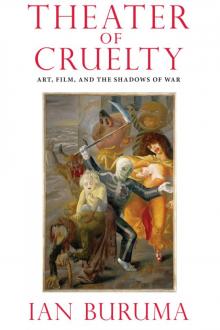 Theater of Cruelty
Theater of Cruelty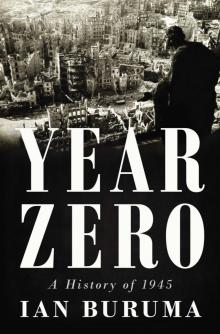 Year Zero
Year Zero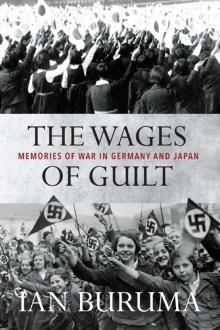 The Wages of Guilt
The Wages of Guilt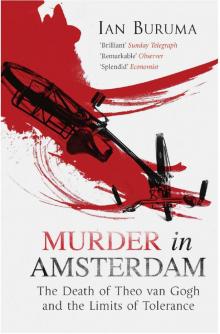 Murder in Amsterdam
Murder in Amsterdam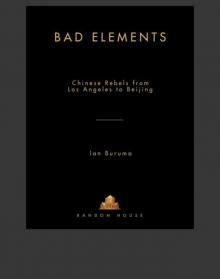 Bad Elements
Bad Elements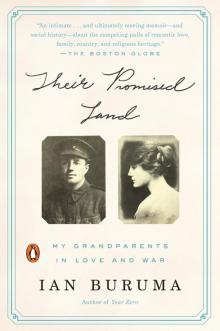 Their Promised Land
Their Promised Land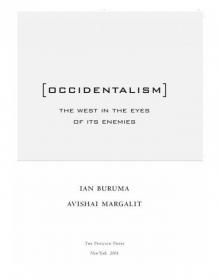 Occidentalism
Occidentalism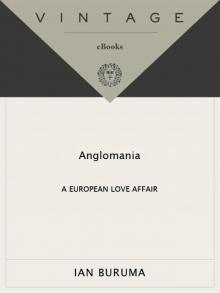 Anglomania
Anglomania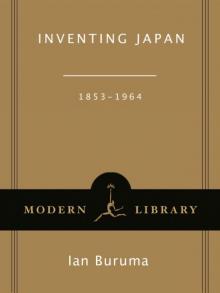 Inventing Japan: 1853-1964 (Modern Library Chronicles)
Inventing Japan: 1853-1964 (Modern Library Chronicles)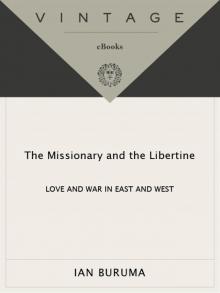 The Missionary and the Libertine
The Missionary and the Libertine